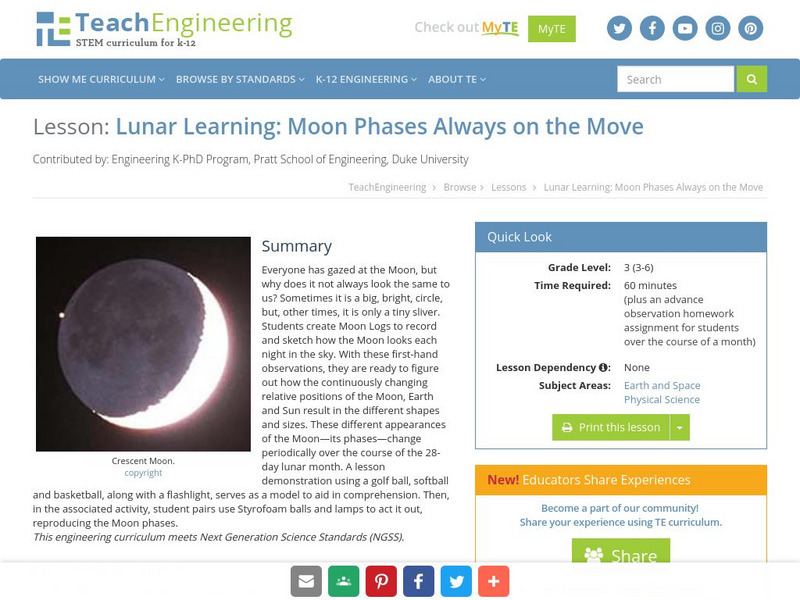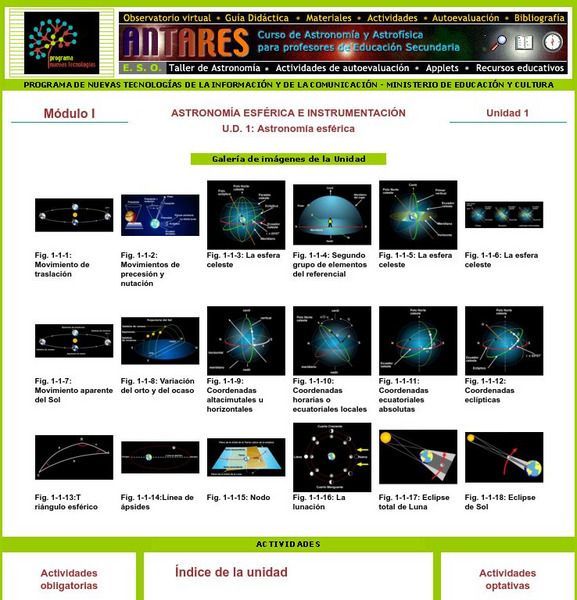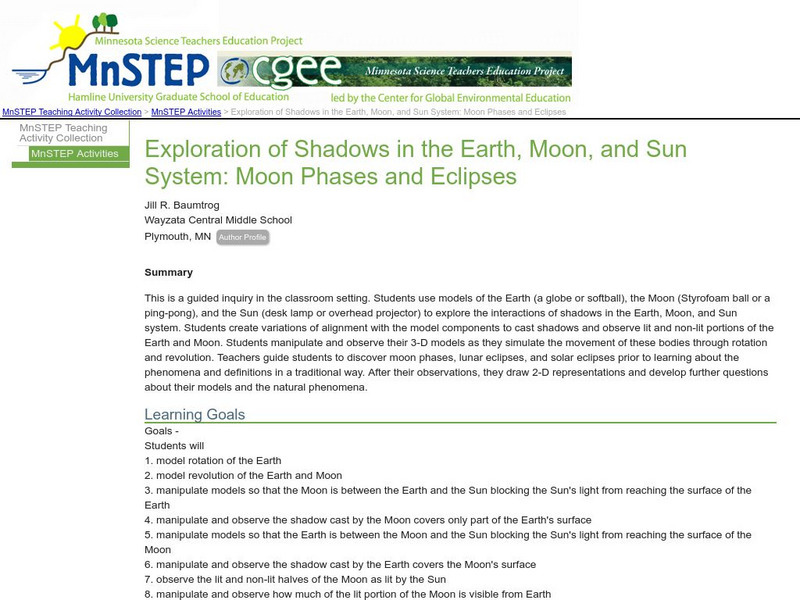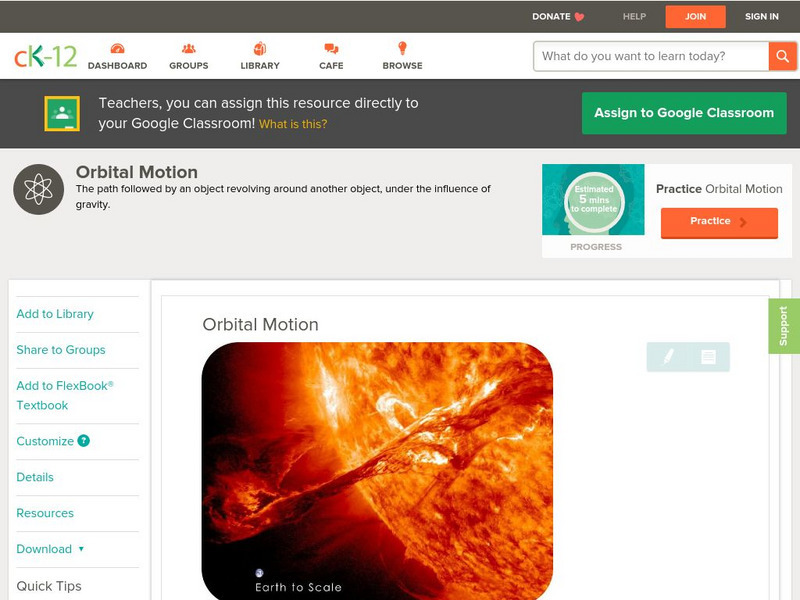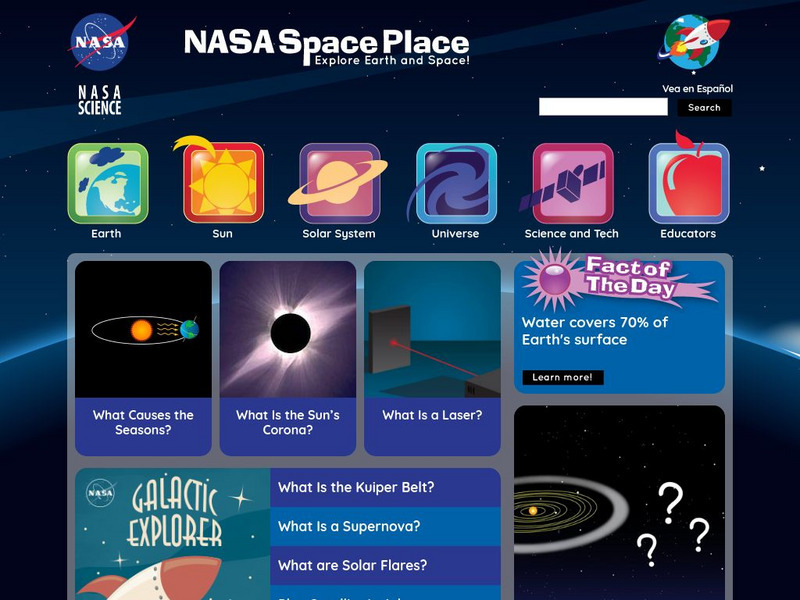Hi, what do you want to do?
TeachEngineering
Teach Engineering: Lunar Learning
Why does the Moon not always look the same to us? Sometimes it is a big, bright, circle, but, other times, it is only a tiny sliver, if we can see it at all. The different shapes and sizes of the slivers of the Moon are referred to as...
University of Texas at Austin
The University of Texas Mc Donald Observatory: Moon Phase Calculator
Interactive tool displays moon phases for any given month and year. Explains why the moon has phases and what the Harvest and Blue Moon are.
ArtsNow
Arts Now Learning: Moon Phaser [Pdf]
In this activity, 4th graders will study the moon for a period of one month and learn to identify each major moon phase. They will then describe the moon through poems, haikus, and similes.
Science Struck
Science Struck: How Was the Earth Created
This resource gives a detailed explanation of the stages that the Earth and the solar system went through beginning with their origins in the Big Bang up to the present time.
ClassFlow
Class Flow: Moon Phases
[Free Registration/Login Required] This flipchart is a discussion of the moon and its phases.
Other
Calculator Cat: Current Moon Phase
Online calculator that posts up-to-the-minute phase of moon. Instructions are provided through a link on how to add this feature to your own web page.
Science Struck
Science Struck: Simple Ideas for Your Kid's Solar System Project
Provides detailed instructions for how to help a student make a solar system model, and additional suggestions for making a constellation poster, making a model showing phases of the moon, and creating a solar system model to scale.
Curated OER
Eyes on the Sky, Feet on the Ground: The Earth's Moon
In this online textbook produced by the Smithsonian, students explore the phases of the moon, the moon's orbit, the origin of the moon, and the tides. Includes numerous inquiry-based activities.
Ministerio de Educación (Spain)
Ministerio De Educacion: Atronomia Esferica Modulo I Unidad 1
Recognize the major constellations and learn about the sky during the different seasons of the year. You will also be able to measure the height of the mountains of the moon.
Curated OER
Science Kids: Science Images: Moon Phases Diagram
Learn more about the phases of the Moon with this useful moon phases diagram. The phases include new moon, waning crescent, last quarter, waning gibbous, full moon, waxing gibbous, first quarter and waxing crescent. For more information...
CK-12 Foundation
Ck 12: First Grade Science: Sky Patterns
[Free Registration/Login may be required to access all resource tools.] Describes patterns that can be found in the movement of the Sun, Moon, and stars.
Better Lesson
Better Lesson: Our Stars
In this lesson, learners will observe and communicate how the stars are in the sky both day and night. The extremely detailed lesson includes photos and videos of the lesson in actions, examples of student's work, materials, parent...
National Institute of Educational Technologies and Teacher Training (Spain)
Ministerio De Educacion: El Universo, La via Lactea Y El Sistema Solar
Ministerio de Educacion: El Universo, la Via Lactea y el Sistema Solar.
Science Education Resource Center at Carleton College
Serc: Exploration of Shadows: Earth, Moon, Sun System: Moon Phases Eclipses
A guided inquiry where students participate in the simulation of moon phases and eclipses.
Alabama Learning Exchange
Alex: Sun, Earth, and Moon: Calendar of Events
During this lesson students are going to take a look at moon phases and sunrise-sunset times in order to learn about daylight hours. Students discover that we do not always have the same amount of daylight each day. This lesson is best...
Other
The Weather Underground: Weather in France
The Weather Underground lets you click on the name of a town or city in France and find the current weather conditions (temp, humidity, dew point, wind etc.) and a week's forecast. Includes moon phase, sunrise and sunset times.
Utah Education Network
Uen: Patterned Paragraphs
Students will learn about the importance of including specific details when writing. Students will watch the teacher model "How to Make a Peanut Butter Sandwich." Then student will replicate the process for writing with specificity as...
CK-12 Foundation
Ck 12: Physical Science: Orbital Motion
[Free Registration/Login may be required to access all resource tools.] Orbital motion and why it occurs, and the orbits of the Earth around the sun and the moon around the Earth.
NASA
Nasa: Eye Safety During Solar Eclipses
This resource, which is provided for by NASA, gives great information on protecting your eyes during solar eclipses. Your eyes are very difficult to replace. Even when 99% of the Sun's surface is obscured during the partial phases of a...
Other
Astromador: Astronomia Para Amadores
This resources focuses exclusively on astronomy. It's packed with historical facts about space exploration, famous people who pioneered the study of stars and planets. It features chronological list of space exploration, current news,...
NASA
Nasa: The Space Place
This site from NASA's Space Place is geared towards early elementary learners. It offers detailed instructions for crafts and activities related to space, games and a teacher resource area. Students can also ask an expert at this site.
American Geosciences Institute
American Geosciences Institute: Astronomy
Eight hands-on lessons module in which students explore the characteristics of planet Earth, its moons, the sun, the solar system, planets, and the difference between science fact and science fiction.
Curated OER
Educational Technology Clearinghouse: Clip Art Etc: Galileo Galilei
Galileo Galilei (15 February 1564 - 8 January 1642) was a Tuscan (Italian) physicist, mathematician, astronomer, and philosopher who played a major role in the scientific revolution. His achievements include improvements to the telescope...





